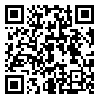

BibTeX | RIS | EndNote | Medlars | ProCite | Reference Manager | RefWorks
Send citation to:
URL: http://nmcjournal.zums.ac.ir/article-1-498-en.html
Background: As a chronic disease, heart failure (HF) is a growing problem that not only impacts patients but also their family members and friends. Self-care is the main part of HF treatment. Despite the significance of determining variables involved in self-care, the relationships of self-efficacy, illness perception, and social support with self-care and the predictive roles of these variables in the treatment of HF have not been investigated.
Objectives: The present study was aimed at exploring the predictive roles of self-efficacy, illness perception, and social support in self-care of patients with heart failure.
Methods: In this predictive correlation study, 149 patients with HF were selected through convenience sampling from Tabriz Research Treatment Centre of Heart in 2016. To collect data, a demographic information questionnaire, self-care behaviour scale, general self-efficacy (GSE), brief illness perception questionnaire (Brief-IPQ), and social support scale were used. To analyse data, SPSS software version 16, descriptive statistics, Pearson correlation coefficient, and multiple stepwise regression analyses were employed.
Results: Out of 149 subjects, 102 (68%) participants were male, and 47 (32%) of them were female. The mean and standard deviation of samples’ age were (64.40±10.32) ranging from 37 to 88 years. Most of participants were married (82%). The mean scores were as follows: Self-care (40.66±13.16), self-efficacy (45.81±22.03), illness perception (56.05±18.24), and social support (49.09±6.74). Data analysis demonstrated significant correlations between illness perception and self-care (p<0.001, r=0.649), self-efficacy and self-care (p<0.001, r=-0.678), social support and self-care (p<0.001, r=-0.518), and age and self-care (p<0.001, r=-0.506). The standardized coefficient of illness perception was (β=0.274), social support was (β=-0.237), self-efficacy was (β=-0.230), and age was (β=-0.211). In addition, 56% of self-care variance is explained by age, social support, self-efficacy, and illness perception.
Conclusion: All of the investigated variables were found to have a predictive role in self-care. Illness perception was recognized as the most effective factor in predicting self-care. Hence, illness perception can be used to explain 27% of self-care ability of patients with HF.
| Rights and permissions | |
 |
This work is licensed under a Creative Commons Attribution-NonCommercial 4.0 International License. |


